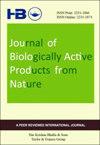粗果Artocarpus hirsutus Lam的种子蛋白。具有胰蛋白酶抑制、杀微生物和抗氧化活性诱导人皮肤癌症(A431)和癌症(HT29)细胞的耗竭
IF 1
Q4 CHEMISTRY, MEDICINAL
Journal of Biologically Active Products from Nature
Pub Date : 2022-01-02
DOI:10.1080/22311866.2021.2008269
引用次数: 1
摘要
摘要:天然胰蛋白酶抑制剂越来越被认为是公认的抗癌或抗微生物疗法。在本研究中,我们从Artocarpus hirsutus的种子中分离出一种蛋白质胰蛋白酶抑制剂,以评估其抗癌、抗氧化和杀微生物的效果。采用离子交换和凝胶过滤色谱法,从毛霉菌种子中分离得到胰蛋白酶抑制蛋白(AhTI)。AhTI的胰蛋白酶抑制活性通过使用反向酶谱法的活性染色得到证实。通过显微镜检查、MTT法和LDH渗漏分析研究了AhTI对人癌症细胞系A431和HT29的影响。通过铁还原力和DPPH自由基清除试验分析了AhTI的抗氧化活性。采用琼脂扩散法测定了AhTI的抗菌活性。研究中使用的纯化方案显著提高了靶蛋白的比活性,从72.65±0.86提高到2048±27.3。AhTI对A431和HT29癌症细胞系的增殖具有显著的活性。体外AhTI显示出强大的抗氧化活性,并对本研究中使用的所有细菌和真菌分离株表现出抗菌活性。特别值得注意的是,AhTI对金黄色葡萄球菌和大肠杆菌特别有效。这项体外研究表明,AhTI是进一步开发针对癌症、微生物感染和氧化应激的新疗法的有前景的候选药物。图形摘要本文章由计算机程序翻译,如有差异,请以英文原文为准。
Seed Protein from Artocarpus hirsutus Lam. with Trypsin Inhibitory, Micro-bicidal and Antioxidant Activities Induces Depletion of Human Skin Cancer (A431) and Colon Cancer (HT29) Cells
Abstract: Natural trypsin inhibitors are increasingly recognised as putative anticancer or antimicrobial therapeutics. In the present study, we isolated a proteinaceous trypsin inhibitor from the seeds of Artocarpus hirsutus to assess its anticancer, antioxidant and microbicidal effects. A trypsin inhibitory protein (AhTI) was isolated from the seeds of A. hirsutus using ion exchange and gel filtration chromatographic methods. The trypsin inhibitory activity of AhTI was confirmed by activity staining using Reverse Zymography. The effect of AhTI on human cancer cell lines (A431 and HT29) was studied by microscopic examination, MTT assay and LDH leakage analysis. Antioxidant activity of AhTI was analysed by ferric reducing power and DPPH radical scavenging assays. An agar well diffusion method was used to check the antimicrobial activity of AhTI. The purification protocols used in the study significantly increased the specific activity of the target protein from 72.65 ± 0.86 to 2048 ± 27.3. AhTI offers significant activity against the proliferation of the A431 and HT29 cancer cell lines. In vitro AhTI shows potent antioxidant activity and exhibits antimicrobial activity against all the bacteria and fungi isolates used in this study. Of particular note, AhTI was particularly effective against Staphylococcus aureus and Escherichia coli. This in vitro study shows that AhTIis a promising candidate for further development novel therapeutics targeting cancer, microbial infections and oxidative stress. Graphical abstract
求助全文
通过发布文献求助,成功后即可免费获取论文全文。
去求助
来源期刊

Journal of Biologically Active Products from Nature
Agricultural and Biological Sciences-Agricultural and Biological Sciences (miscellaneous)
CiteScore
2.10
自引率
0.00%
发文量
21
 求助内容:
求助内容: 应助结果提醒方式:
应助结果提醒方式:


